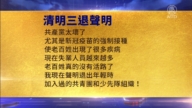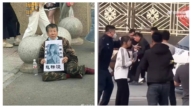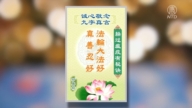【新唐人2014年07月26日訊】在中國大陸食品安全醜聞太多了,毒奶粉、蘇丹紅、瘦肉精、地溝油等讓人們無處可躲,因而對外國品牌情有獨鍾。不過,最近位於上海的一家美資肉類供應商——上海福喜食品有限公司,被揭露使用過期很久的肉類。醜聞不斷髮酵,工廠不僅被查封,上海警方還刑拘了5名工作人員。其實,作為國際大品牌的「福喜」,還波及到了香港和日本食品安全。請看報導。
上海《東方電視臺》記者臥底2個月後,在電視上曝光了「麥當勞、肯德基」等洋速食的食品醜聞視頻。
報導中說,這幾家速食店的供應商——上海「福喜食品有限公司」,涉嫌提供過期變質的牛肉和雞肉。記者拍攝的畫面中顯示,「全副武裝」的工人們將過期近一個月的原料倒入絞肉臺,再經過裹粉、煎炸等過程,就製成了中國孩子們喜愛的「麥樂雞塊」和肯德基的「燻肉餅」。
《東方電視臺》的報導中說,「福喜」將這些過期肉加蓋了「新」日期後,供應到「麥當勞、肯德基和必勝客」等速食連鎖店。甚至這家知名供應商的工人還對記者笑稱﹕「過期肉一是吃不出來,二是吃不死人。」
被曝光後,上海「福喜」成了全社會轟炸的對像,公司目前被查封,上海警方還刑事拘留了5名人員,還有媒體報導說,上海「福喜」可能被罰款70億人民幣。
不僅如此,「麥當勞」的執行長也在媒體上指稱﹕被上海「福喜」騙了﹔而一年內從上海「福喜」進口6000噸肉食加工品的日本商,已暫停了進口﹔香港商也停止進口所有的「福喜」商品。
上海「福喜食品有限公司」隸屬美國「福喜(OSI)集團」,是一家在全球17個國家擁有50多家食品加工廠的國際化食品集團,在2013年美國「福布斯」雜誌的收益榜上,名列第62位。2010年正式進入中國家禽產業,預計今年在中國有1億只鳥禽類的交易量。
北京「益仁平中心」負責人陸軍「由於官方片面的依賴或者迷信行政監管,沒有發揮司法的作用,沒有消費者自身維權的這樣一個作用,也沒有去發揮民間團體的作用,所以就導致出現了這樣的一個局面。」
北京民間的公共衛生組織「益仁平中心」負責人陸軍認為,中國就像一個大染缸,聲譽良好的外資企業,在中國這樣一個腐敗的行政體系和市場體系中,也變了味,而在監管相對更寬鬆的其他地方,中國本土企業的問題不會比「福喜」輕。
其實,「洋食品」在中國不是第一次醜聞纏身,光是「肯德基」就經歷了多次。「肯德基」在2005年遭遇過「蘇丹紅」事件,在2011年受到「豆漿門」的衝擊,在2012年爆出漢堡細菌超標,去年又使用了「問題雞」。
旅美中國社會問題研究人士張健指出,「有法不依、執法不嚴、監管不力」是中國食品安全問題的原因所在,而那些在國外品行良好的外資企業,被中國的經營環境拖下水,甚至走向犯罪,正說明社會體制是極為關鍵的。
旅美中國社會問題研究人士張健:「真正的企業,想要生存、想要給大家提供一個良好的食品安全的話,最主要依靠的是一個體制,而不是說商人的一個道德情操。如果沒有這樣的一個環境的話,多麼高尚的商人,也會被拖落到一個不健康的競爭環境當中。」
不過,中共媒體不僅僅樂於曝光國外在大陸的食品企業。中共喉舌《央視》最近宣稱「蘋果」iPhone手機定位服務可能威脅國家安全。不過,針對這項指控,蘋果公司說,iPhone的功能不會曝露用戶的位置,而且也沒有跟任何政府機構合作。
採訪/易如 編輯/宋風 後製/黎安安
Yet Another Scandal against Foreign Food Brands in China, Why?
Food safety scandals have frequently broken out in
China’s mainland.
Toxic milk powder, Sudan Red, lean meat powder and
gutter oil have left Chinese no place to hide.
Many Chinese thus turned to international food brands.
However, Shanghai Husi Food, a U.S.-owned meat supplier,
was reported to use long expired meat.
As the scandal spreads, Shanghai Husi Food has been shut
down, and five of its employees arrested by the police.
As an international brand, Husi’s scandal has also involved
food safety concerns in Hong Kong and Japan.
Let’s look at the following report.
After secret investigation for two months, Shanghai Dragon
TV broadcast videos about food safety issues in McDonald’s,
KFC and other international fast food brands.
According to the report, the meat provider of those fast
food brands, Shanghai Husi Food is suspected of using
long expired beef and chicken.
The videos clearly show that workers put expired food
ingredients into the meat grinder.
After being breaded and fried, expired meat was made into
McDonald’s chicken nuggets and KFC’s bacon sandwiches,
which are both among favorite foods of Chinese children.
Dragon TV said, Husi printed “new" expiry dates for the
meat and then supplied fast food restaurants such as
McDonald’s, KFC and Pizza Hut with it.
Employees of the famous meat providers even told
the journalist that “Expired meat is hard to find and
does not kill people".
With the scandal being exposed, Shanghai Husi becomes
the target of the whole Chinese society.
The company has been shut down and five of its employees
detained by Shanghai police.
There are media reports saying Husi may be subject to
a fine of 7 billion Yuan ($1.13 billion).
Even McDonald’s chief executive told media that
the company felt “deceived" by Shanghai Husi.
Japanese importers that purchased 6000 tons of processed
meat products per year have stopped the trade immediately.
Hong Kong importers have also done the same.
Shanghai Husi is owned by U.S.-based OSI Group, which is
an international food service provider.
OSI Group owns over 50 food processing plants in
17 countries, and ranked 62nd in Forbes 2013 list of
private companies.
OSI group entered China’s poultry industry in 2010, and
is estimated to have a trading volume of 100 million
fowls in China this year.
Lu Jun, director of Beijing Yirenping Center:"The Chinese
Communist Party (CCP) is overly depending on
administrative supervision.
Neither justice system nor customers or civil groups have
functioned well on food safety issues.
Therefore we see such scandals frequently breaking out."
Director of Yirenping Center, Lu Jun comments that
the CCP’s system is like a “dye vat" that leads to corruption.
Even reputable foreign companies are negatively influenced
if they enter the CCP’s corrupt administrative and
market system.
On the other hand, in other places with looser administration,
Chinese food companies can share similar problems
with Husi.
This is far from the first time that foreign food brands
are hit by scandals in China.
Only KFC has experienced several scandals in the past.
In 2005, KFC was hit by the Sudan Red incident.
In 2011, “soybean milk scandal" broke out.
In 2012, KFC’s hamburger bacteria level was detected to
exceed the standard.
Last year, “instant chicken" issue struck
the international brand again in China.
Zhang Jian, researcher of China social issues, says China’s
food safety issues result from
“Not abide by the law", “Not strictly enforce the law",
and weak regulation or supervision.
The fall of reputable foreign companies under China’s
bad circumstance exactly proves how important
an overall social regime is.
Zhang Jian,:"If companies
want to simultaneously make profits and offer reliable
food quality, the key lies in the social regime
instead of companies’ moral standards.
Without a healthy environment, even good business owners
can be forced to do bad things due to unhealthy competition."
On the other hand, the CCP mouthpieces had frequently
reported scandals directed against foreign food companies
in China.
The CCTV recently claimed that the “frequent locations"
in iPhone’s “location Services" feature may “pose a threat
to national security."
Apple Inc. responded that the function won’t expose user
location and it had never worked with any governmental
agency to exploit the function.
Interview/YiRu Edit/SongFeng Post-Production/Lianan


























